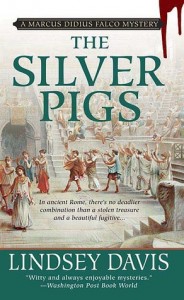 Format read: print book borrowed from the Library
Format read: print book borrowed from the LibraryFormats available: ebook, hardcover, paperback, audiobook
Genre: Historical mystery
Series: A Flavia Albia Mystery, #1
Length: 352 pages
Publisher: Minotaur Books
Date Released: June 11, 2013
Purchasing Info: Author’s Website, Publisher’s Website, Goodreads, Amazon, Barnes & Noble, Kobo, Book Depository
Flavia Albia is the adopted daughter of Marcus Didius Falco and Helena Justina. From her mother, she learned how to blend in at all levels of society; from her father, she learned the tricks of their mutual professional trade. But her wits and (frequently) sharp tongue are hers alone.
Now, working as a private informer in Rome during the reign of Domitian, Flavia has taken over her father’s old ramshackle digs at Fountain Court in the Surbura district, where she plies her trade with energy, determination, and the usual Falco luck. Recently hired to help investigate a fatal accident, she finds herself stuck with a truly awful person for a client and facing a well-heeled, well-connected opponent.
That is, until her client unexpectedly dies under what might be called “suspicious circumstances.” While this is not a huge loss for society, it is a loss for Flavia Albia’s pocket. Even worse, it’s just one of a series of similar deaths for which she now finds herself under suspicion. Before things go from abysmal to worse, Flavia must sort out what is happening, and who is responsible.
My Review:
 The Ides of April reminds me of the best and worst of the Marcus Didius Falco stories. The reader does have to like the narrator’s voice (in this case Falco’s adopted daughter, Flavia Albia). It takes forever to get both the story and the mystery set up and finally running. Both that story and that mystery are immersed in the daily life of Imperial Rome, which in detail tends to be surprisingly like modern life.
The Ides of April reminds me of the best and worst of the Marcus Didius Falco stories. The reader does have to like the narrator’s voice (in this case Falco’s adopted daughter, Flavia Albia). It takes forever to get both the story and the mystery set up and finally running. Both that story and that mystery are immersed in the daily life of Imperial Rome, which in detail tends to be surprisingly like modern life.
And there is that element of the bear dancing: you’re not surprised it’s done well, you’re surprised it’s done at all. By “it” I mean the concept of a hard-boiled detective series set in Imperial Rome circa 69-79 AD in the case of the Falco series. Or in Flavia Albia’s case, sometime after 81 AD, and Flavia seems to be slightly less hard-boiled, not to mention female.
On the other hand, unlike her father, Flavia seems to have been raised to the business from the point where the Falcos adopted her. She has an outsider’s perspective on Rome and its citizens, and she feels the need to be independent and productive.
While Flavia (and Falco’s) occupation as an informer or inquiry agent may seem anachronistic, Flavia’s employment in particular doesn’t seem that way. Women in this time period had more independence than in many later periods until our own.
The case itself is interesting because it’s based on a snippet of real history. There was a mysterious “needle-poisoner” who apparently was never caught. So Flavia Albia’s introduction is one potential scenario.
But what we see is Flavia making her way. We do not see her formidable parents, and that’s probably a good thing. They remain supportively in the background, as they should. This is her story. Flavia is standing on her own two feet, even when they sometimes lead her astray.
There is definitely a part of this case where she is very much led astray. But she gets herself back on track before the end.
And, like so many of the stories starring her parents, once she gets back on track, the adventure (and misadventure) whips up to a page-turning pace before all the loose ends are tied up.
Escape Rating B: Flavia Albia’s story is one that rewards an initial investment of time and tracking of all the dramatis personae. Flavia has a large adopted family, and there are a number of friends and frenemies who are tracking her, not just because of her own cases, but as leftovers from her parents’ salad days. Keeping everyone straight takes a bit of doing.
This is a classic mystery in the sense that all the clues are laid out for the reader, but it is necessary to piece them together. I figured out who probably “done it” but not the motives for quite a while.
A big part of what makes this story interesting is Flavia Albia herself. Her point of view may seem, or may be, a bit 21st century, but it is in keeping with her mother’s perspective. Also, Flavia Albia is an outsider who has the veneer of an insider. It makes her a good investigator. She’s also an interesting woman because she is independent.
She makes mistakes, and then sees them and grows from them.
One thing I wonder about for the future. She forges an interesting working relationship with the runner, who of course, is more than he first appears. It reminds me a lot of the early days of Falco’s relationship with Helena Justina. I wonder…
